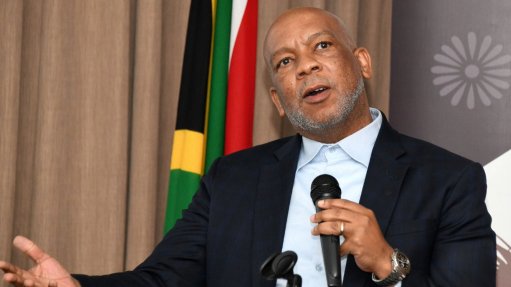Recent accidents raise questions over effectiveness of freight sector self-regulation
Recent accidents involving heavy vehicles on Gauteng’s roads should make the local freight industry question the value of self-regulation, Gauteng Roads and Transport MEC Dr Ismail Vadi said on Monday.
Speaking at the Gauteng Freight Summit, in Boksburg, he referred to the multivehicle crash that had taken place last week when a truck collided with 48 vehicles on the N12 in Alberton, noting that it had been reported that the truck driver was a repeat offender with a history of recklessness.
“If media reports are correct. . . then we must ask ourselves: What is the value of self-regulation if the industry cannot rein in its members and insist on adherence to acceptable standards?,” Vadi asked.
He added that while it may be true that such accidents were few and far between, when they did occur, the public impact was huge and it led to understandable outrage and anger.
“This provides all of us an opportunity to introspect and look for sustainable solutions,” he stated.
Vadi added that, in addition to the need for greater attention to self-regulation, government regulation should not stifle the industry, but rather harmonise government’s role in meeting the challenges of congestion, pollution, economic beneficiation, safety and urban mobility.
“I believe that it would be unworkable in the long run for government to merely make the stick longer to deal with freight overweight, unfit vehicles and drivers on our road network. A longer stick in the hands of the authorities is not the magic wand or ultimately solution driven,” he said.
Vadi noted that accidents on Gauteng’s road network caused by some freight companies, through unfit drivers and vehicles, should not define the perception of the freight network as a whole, stating that the discussion around freight, and aligning it more optimally, productively and as a generator of economic value, required an ongoing and deeper discussion.
The MEC said the freight and logistics sector faced a number of challenges, including the insufficient capacity of the rail network and terminals to supply current and future demand; the inconsistent and ineffective control of overloading in Gauteng; the problematic application of freight regulations; congestion, which led to unsafe and inefficient road travel; limited accessibility to terminals and congestion during peak hours; and the imbalance in road and rail transport.
He pointed out that, simultaneously, Gauteng’s population was forecast to increase from 12.5-million people to 18.7-million in 2037, while the vehicle population would grow from 3.5-million to 6.5-million and morning peak hour trips were projected to increase from 2.2-million to 3.8-million in 2037.
Therefore, the traffic congestion experienced today would only increase over time, he said.
“If this impacts negatively on our economy and how efficient we are as a province or city-region, the picture does not look very promising in the near future.
“We are called upon to respond to this future reality. How our freight plan and a supporting road network come together is critical for handling present and future growth of an increasing population, a higher number of cars on our roads, a larger formal workforce and an expanding economy,” Vadi said.
DURBAN–GAUTENG FREIGHT CORRIDOR
Vadi noted that the National Development Plan, which served as a strategic framework for all future government planning, stated that “by 2030 the Durban–Gauteng freight corridor should be a model [in terms of] how to strengthen and optimise freight corridors,” adding that the freight corridor project would, therefore, be the essence of government’s freight-related work over the next 15 years.
Also speaking at the summit, Transnet programme director for the Gauteng–Durban corridor rail expansion Peet Benade said that, by 2022, the corridor’s demand was expected to exceed its current capacity, despite the additional capacity brought about through current upgrades.
Benade said the planned corridor upgrade comprised the development of the Gauteng Freight Ring, the expansion of Gauteng’s container terminals, increasing the capacity of the Natcor rail line between Gauteng and Durban and the development of Durban’s port and rail terminals.
These elements of the project were all in the concept stage, he said, adding that work on the development framework would start later this year or early next year.
Further, Transnet would also, going forward, continue and expand its stakeholder engagement process, and start with a funding option process.
Comments
Press Office
Announcements
What's On
Subscribe to improve your user experience...
Option 1 (equivalent of R125 a month):
Receive a weekly copy of Creamer Media's Engineering News & Mining Weekly magazine
(print copy for those in South Africa and e-magazine for those outside of South Africa)
Receive daily email newsletters
Access to full search results
Access archive of magazine back copies
Access to Projects in Progress
Access to ONE Research Report of your choice in PDF format
Option 2 (equivalent of R375 a month):
All benefits from Option 1
PLUS
Access to Creamer Media's Research Channel Africa for ALL Research Reports, in PDF format, on various industrial and mining sectors
including Electricity; Water; Energy Transition; Hydrogen; Roads, Rail and Ports; Coal; Gold; Platinum; Battery Metals; etc.
Already a subscriber?
Forgotten your password?
Receive weekly copy of Creamer Media's Engineering News & Mining Weekly magazine (print copy for those in South Africa and e-magazine for those outside of South Africa)
➕
Recieve daily email newsletters
➕
Access to full search results
➕
Access archive of magazine back copies
➕
Access to Projects in Progress
➕
Access to ONE Research Report of your choice in PDF format
RESEARCH CHANNEL AFRICA
R4500 (equivalent of R375 a month)
SUBSCRIBEAll benefits from Option 1
➕
Access to Creamer Media's Research Channel Africa for ALL Research Reports on various industrial and mining sectors, in PDF format, including on:
Electricity
➕
Water
➕
Energy Transition
➕
Hydrogen
➕
Roads, Rail and Ports
➕
Coal
➕
Gold
➕
Platinum
➕
Battery Metals
➕
etc.
Receive all benefits from Option 1 or Option 2 delivered to numerous people at your company
➕
Multiple User names and Passwords for simultaneous log-ins
➕
Intranet integration access to all in your organisation




















